We remove the spark plug tips along with the high-voltage wires, the ignition coils (you can only disconnect the connectors, leaving them on the valve cover), the throttle drive cable and, having disconnected the wires from the lubrication and cooling system sensors, remove the wiring harness from the head cover brackets
Drain the coolant and remove the upper radiator hoses and the mass air flow sensor along with the air ducts.
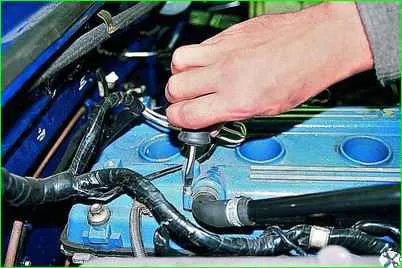
Use a screwdriver to loosen the clamps and remove the large hose of the ventilation system
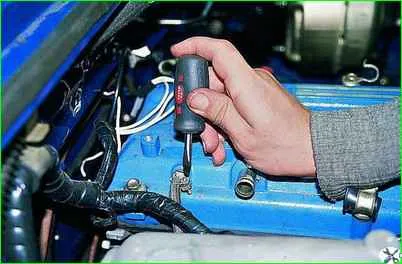
Remove the small hose of the crankcase ventilation system
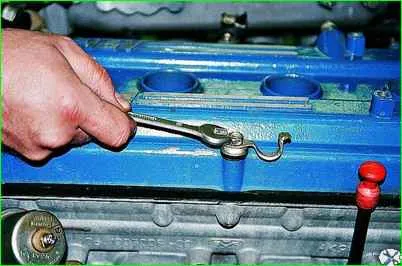
Use a 12mm wrench to unscrew the screws securing the cylinder head cover
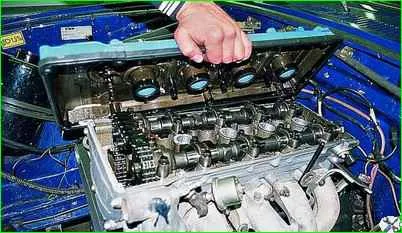
Remove the block head cover
Using the 36mm head, set the crankshaft to the TDC position of the compression stroke of the first cylinder, turning it by the pulley mounting bolt
(the mark on the crankshaft pulley should coincide with the protrusion on the front cover of the cylinder block, and the marks on the camshaft sprockets should coincide with the upper edges of the cylinder head).
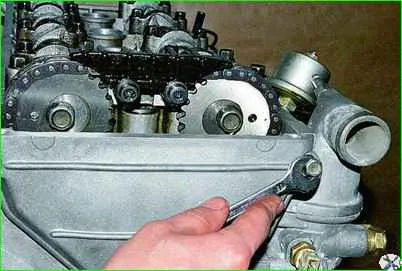
Using a 12mm wrench, unscrew the four bolts and remove the front cylinder head cover.
Remove the upper hydraulic tensioner (see Hydraulic chain tensioner GAZ-3110).
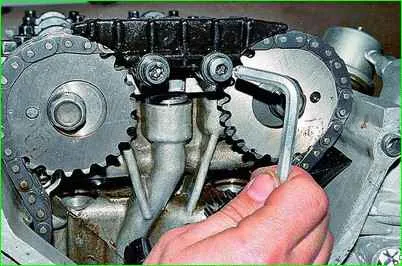
Use a 6mm hex wrench to unscrew the two screws and remove the upper chain guide.
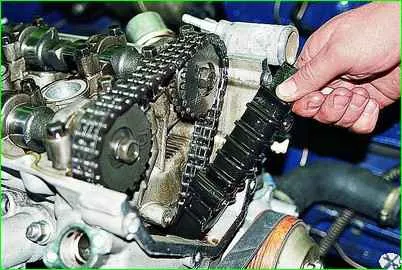
After unscrewing two screws with a size 6 hex key, remove the middle chain guide.
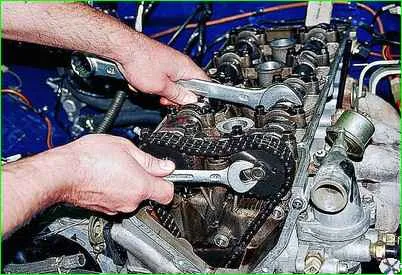
Using a 17mm wrench, unscrew the bolt securing the exhaust camshaft sprocket, holding the shaft with a 30mm wrench.
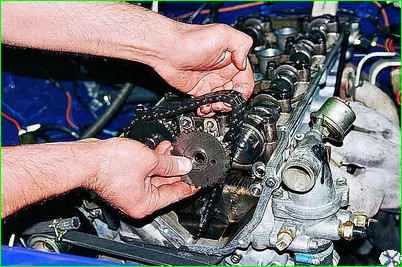
Remove the star. Similarly, remove the sprocket from the second camshaft.
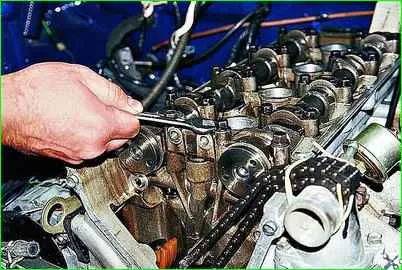
Using a 12mm wrench, unscrew the four bolts securing the front camshaft cover.
Successively, by half a turn, loosen the tightening of the bolts securing the camshaft covers until the valve springs stop pressing the shafts and unscrew the bolts.
Remove the front cover and remove the plastic half rings
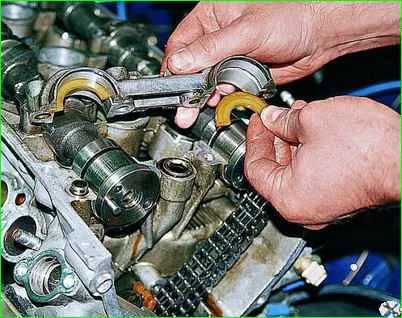
Remove the remaining covers
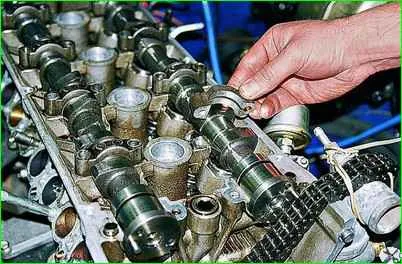
Remove the camshafts.
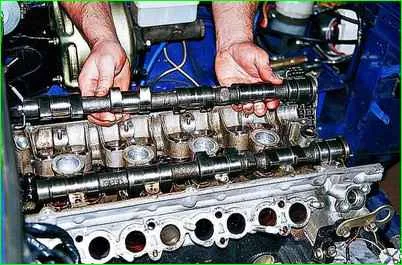
Using a 12mm wrench, unscrew the bolt securing the phase sensor plate and install it on the new exhaust valve shaft.
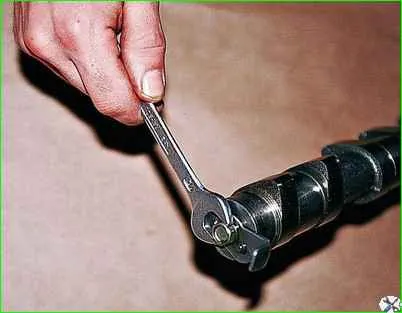
After removal, wash all parts with gasoline, wipe and dry.
Inspect the camshafts. If burrs, holes, or cracks are found on the journals and cams, replace the shafts.
Measure the diameter of the camshaft journals.
The nominal diameter of the first journal (closest to the sprocket) is 42.0+0.050 -0.075 mm, the maximum permissible is 41.9 mm.
The nominal diameter of the remaining necks is 35+0.050 -0.075 mm, the maximum permissible is 34.9 mm.
If the diameter of at least one journal is less than the maximum permissible value, replace the camshaft.
Measure the height of the cams. The nominal height of the cam is (46.0-0.25) mm, the maximum permissible height is 45.5 mm.
If the height of at least one cam is less than the maximum permissible, replace the camshaft.
Remove small scratches on the journals and cams by grinding, and then polish the journals and cams.
Install the camshaft on two prisms and measure the runout along the middle journal with an indicator.
Nominal runout is 0.025 mm, maximum permissible is 0.04 mm. If the runout is greater, replace the camshaft.
Check the clearances in the camshaft bearings. To do this, you need to place a cylindrical mandrel with a diameter of 35.0-0.02 mm in the camshaft support, lubricated with clean engine oil, to center the cover.
Install the camshaft cover, tighten the cover bolts to a torque of 19–23 Nm (1.9–2.3 kgcm).
Pull out the mandrel towards the rear end of the cylinder head.
Measure the inner diameter of the camshaft support and calculate the clearance as the difference between the diameter of the support and the diameter of the corresponding camshaft journal.
The maximum permissible gap is 0.15 mm.
If there is more clearance in at least one camshaft bearing, replace the shaft or cylinder head.
The camshaft caps are machined together with the cylinder head, so they cannot be swapped. Each cover has a serial number stamped on it.
The numbering of the caps begins with the front support (closest to the gear) of the intake camshaft.
Then the exhaust camshaft caps on the camshaft gear side are numbered.
A phase sensor plate is installed at the rear end of the exhaust camshaft.
Lubricate the camshaft journals and cams and the cylinder head bearings with clean engine oil.
Place the camshafts in the cylinder head:
- intake camshaft - upward with the pin for sprocket installation, exhaust camshaft - with the pin to the right.
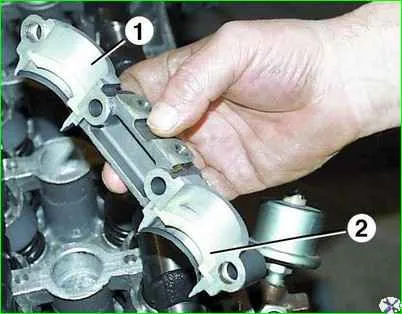
Lubricate the front cover 1 of the camshafts with the thrust half-rings 2 installed in it with clean engine oil.
Install cover 1 on the guide bushings in the camshaft supports.
In this case, half rings 2 should fit into the grooves on the camshafts.
Lubricate covers 3 and 7 with clean engine oil and install them on the guide bushings in the camshaft supports.
Screw in the bolts securing the covers until the covers touch the supports.
Lubricate the remaining camshaft covers with clean engine oil and install them in place.
Screw in the bolts securing the covers until the covers touch the supports.
Tighten the camshaft cover bolts to a torque of 19-23 Nm (1.9-2.3 kgcm).
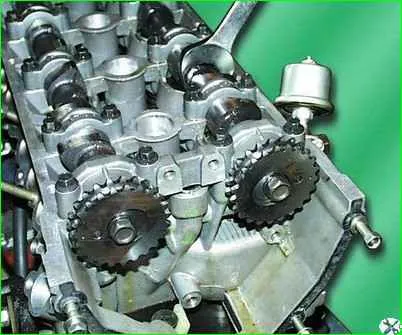
Check that the camshafts rotate easily. To do this, turn each shaft with a wrench by the square on the shaft so that the valve springs of any cylinder are fully compressed (the cams of the shaft are directed downward).
Turn the camshaft slightly again, it should turn further under the action of the valve springs until the next cams come into contact with the valve tappets.
Rotate the camshafts so that the sprocket alignment pins are positioned horizontally and directed in different directions (the position of the camshafts corresponds to the position of the piston of the 1st cylinder at TDC).
Put on the camshaft drive chain (see “Replacing the chains of the ZMZ-406 GAZ-3110 engine”).
Install the hydraulic chain tensioner, see “Hydraulic chain tensioner for GAZ-3110.”
Install all removed parts in the reverse order of removal.





